As an Amazon Associate I earn from qualifying purchases.
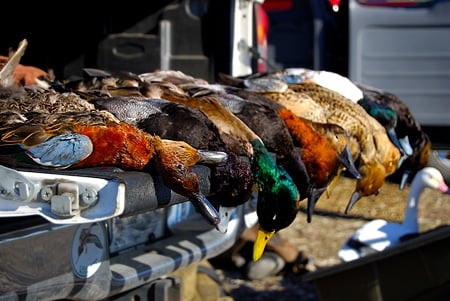
UPDATE: I want to thank everyone who has responded to this post, both below in the comments section and to me directly via email. More than one of your responses has been so moving it’s stopped me in my tracks. And Zane from Cleveland, your letter choked me up pretty bad. It is rare for me to write about such things; doing so feels like opening a vein in public. I am glad to know that I am not alone out there. Thank you.
I have been dealing a lot of death lately. I’ve hunted five of the past eight days, and have killed birds on each trip. My larder is filling, and Holly and I are eating well. Lots of duck, some pheasant and even a little of the venison I have left over from the 2010 season. That is the good side of all this, the side of hunting that most people can embrace. I hunt for a lot of reasons, but for me the endgame is always the table.
It is the journey to that table that can sometimes give people pause. What I do to put meat in my freezer is alien to most, anathema to some. In the past seven years, I can count on one hand the times I’ve had to buy meat for the home. This fact alone makes me an outlier, an anomaly. And that I am unashamed — proud, really — of this seems to cause a lot of folks I meet to look at me funny: I am a killer in their midst.
Not too long ago, I was at a book signing event for Hunt Gather Cook when a young woman approached me. She was very excited about foraging, and she had loved that section of my book. Then her face darkened. She told me she’d also read my section on hunting. “How can you enjoy killing so much? I just don’t understand it. You seem like such a nice person, too.” It took a few minutes for me to explain myself to her, and I am grateful that she listened. She left, I think, with a different opinion.
A few weeks later, I was at the University of Oregon talking about wild food to some students. When I mentioned hunting, I could feel the temperature in the room drop. It occurred to me that no one there was a hunter, nor were they close to any hunters. I called for a show of hands. One guy raised his. I asked him briefly about his hunting experience, and it was obvious that it had been traumatic for the poor kid. I let the topic slide and moved on to mushrooms.
When I was in Cambridge, Massachusetts, I spoke with more than 100 diners during my book dinner at the excellent restaurant Craigie on Main. Only four were hunters, although a few more wanted to start. Over the course of the night, I fielded weird question after weird question from diner after diner. Have I ever shot someone? Did I actually eat what I shot? Wasn’t I afraid of diseases? It was a stark show of ignorance. Not stupidity, mind you, just an utter lack of knowledge of what hunting is all about.
To be sure, these encounters were in college towns among a certain set of people. I had some book events, notably those in Montana, Pittsburgh and Austin, where most everyone who attended either hunted or was at least familiar with it. And in most places I could be assured of a healthy smattering of fellow hook-and-bullet types or farmers, who are equally familiar with the death of animals.
But the fact remains: Most people reading this have never killed anything larger than an insect, and among those who have it’s usually a been fish, or an accident — like running over someone’s dog. Most people have no idea what it’s like to take the life of another creature, let alone why someone would actively seek to do so. Let me try to explain to you the way I did to my young foraging friend on book tour. Let me tell you what it means to kill, at least for me.
To deal death is to experience your world exploding. It is an avalanche of emotion and thought and action.
Armed with a shotgun, it is often done without thought, on instinct alone. A flushing grouse gives you no more than a few seconds to pull the trigger before it disappears into the alders. A rabbit can leap back into the brambles in even less time. Unless you are perfect in that split second, the animal wins. And being human, we are far from perfect. Even with ducks, where you often have plenty of time to prepare for the shot, their speed and agility are more than adequate defenses. We hunters fail more than we succeed.
This is why we will often whoop it up when we finally bring a bird down: We are not being callous, rejoicing in the animal’s death. It is a hard-wired reaction to succeeding at something you have been working for days, months, even years to achieve. In some corner of your brain, it means you will eat today. This reaction can look repulsive from the outside.
Should you arm yourself with a rifle, you then must wrestle your conscious mind. Buck fever is real. A huge set of antlers will hypnotize the best of us, man and woman alike. Even if the animal lacks antlers, as mine often do, you have to contend with The Twin Voices: On one shoulder sits a voice shouting, Shoot! Shoot! You might not get another chance! On the other shoulder sits another voice, grave and calm: Be careful. You must not put that bullet in a place where the animal will suffer. Better to pass a shot than wound an animal. A wise hunter does not kill lightly.
In that moment when the game shows itself and you ready yourself to shoot, all that matters is that you do your job correctly. And that job is to kill cleanly and quickly. The animal deserves it; we would want no less were the tables turned. And make no mistake: A great many hunters, myself included, do this mental table-turning with some frequency. Seeing animals die so often makes us think of our own death, and I can assure you most of us would rather die with a well-placed shot than wither in a hospital.
We also know all too well that we are fallible creatures. When we fail to kill cleanly, when we wound the animals we seek, it is our duty to end their suffering ourselves. If there is a moment in this whole process that breaks my heart, it is this one. Everything wants to live, and will try anything it can to escape you. We see ourselves in this struggle, feel tremendous empathy for the struggling bird, the fleeing deer. It is a soul-searing moment where part of you marvels at the animal’s drive to live — to escape! — at the same time the rest of you is consumed with capturing it as fast as possible so you can end this miserable business. This internal conflict is, to me, what being human is all about. A coyote or a hawk has no remorse. We do.
I am not ashamed to tell you that I have shed a tear more than once when I’ve had to deliver the coup de grace to a duck. I’m not sure what it is about ducks, but they affect me more than other animals. I always apologize to it, knowing full well that this is a weak gesture designed mostly to help me feel better. But it does help me feel better. At least a little. So I keep doing it.
As the moment of killing fades, death rides home with you in the back of the truck. Once home, you must transmogrify the animal you killed into meat. The transformation is a mystical one, and every time I “dress” game — such a pleasant euphemism, that — I marvel at how fast my mind toggles from hunter to butcher to cook.
It is a necessary process, and one that is vital to why I have chosen this life, why I am a hunter.
I look down at my keyboard and see death under my fingernails. I smell the fat and gore and meat of dead ducks upon me; it’s been a good week of hunting. And because I eat everything on a duck but the quack, I have become intimate with the insides of waterfowl. Over the years, I’ve gutted and taken apart so many animals that I know the roadmap blindfolded. And that road leads to meals long remembered. I reach into a deer’s guts without thought: I want those kidneys, and that liver. I turn my arm upwards and wrap my fingers around its stopped heart, slick and firm. It will become heart cutlets, or jaeger schnitzel.
Once plucked and gutted, I can take apart a duck in 90 seconds. Maybe less. My fingers intuitively know which way and how hard to pluck each feather from a pheasant’s carcass. I know just where to put my boning knife, sharp as lightning, to slice the tendons that hold a hog’s tongue into its head. I use the same knife to caress its hind legs, separating the natural muscle groups apart along each seam. Some will become roasts, others salami. Animal becomes food. The pop of a goose’s thigh bone disjointing from its body no longer sickens me; all it means is that I need to slip my knife under that bone and around the coveted “oyster,” the best bite on any bird.
Wasting meat is the sin I cannot forgive. When I kill an animal, its death is on my hands, and those animals to whom I’ve had to deliver the coup de grace are especially close to me. There is a bond between us that requires that I do my part to ensure they did not die for nothing. This is why I spend so much time creating recipes for every part of the animal. Nature wastes nothing, and neither should I. It pains me to know that some hunters do not share this feeling, that they care only for backstraps or breasts — and while I know that coyotes and buzzards will eat what we do not, I do not hunt to feed those creatures.
You might ask me that with all this, why bother eating meat at all? Why deal with all the moral and emotional implications? In the face of such constant death, is it not better to be a vegetarian?
For me, no. It is a cold fact that no matter what your dietary choice, animals die so you can eat. Just because you choose not to eat the flesh of animals does not mean that their homes did not fall to the plow to become acres of vegetables and soybeans, wheat and corn. Habitat, more than anything, determines the health of a species. The passenger pigeon may have been snuffed out by wanton, unregulated hunting, but it was the massive destruction of virgin forest — forest cleared to grow crops — that brought the pigeon to the brink. I have nothing against vegetarians, and the vast majority I’ve met understand what I do and respect it. But to those few who do not, I say this: We all have blood on our hands, only I can see mine.
It all boils down to intimacy. Hunting has created an uncommon closeness between the animals I pursue, the meat I eat, and my own sense of self. There is a terrible seriousness to it all the underlies the thrill of the chase, the camaraderie of being with my fellow hunters and deep sense of calm I feel when alone in the wild. I welcome this weight: It fuels my desire to make something magical with the mortal remains of the game I manage to bring home. It is a feeling every hunter who’s ever stared into the freezer at that special strip of backstrap, or hard-won bird or beast understands.
Meat should be special. It has been for most of human existence. And no modern human understands this more than a hunter. I am at peace with killing my own meat because for me, every duck breast, every hog tongue, every deer heart is a story, not of conquest, but of communion.
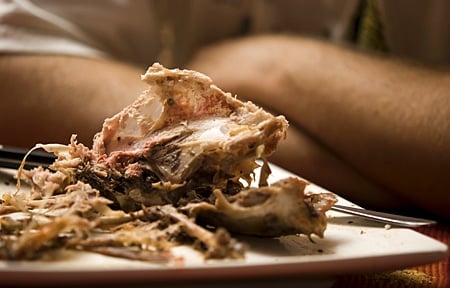
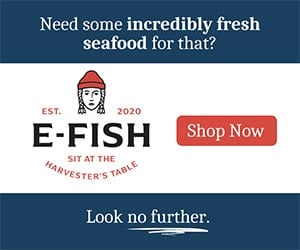
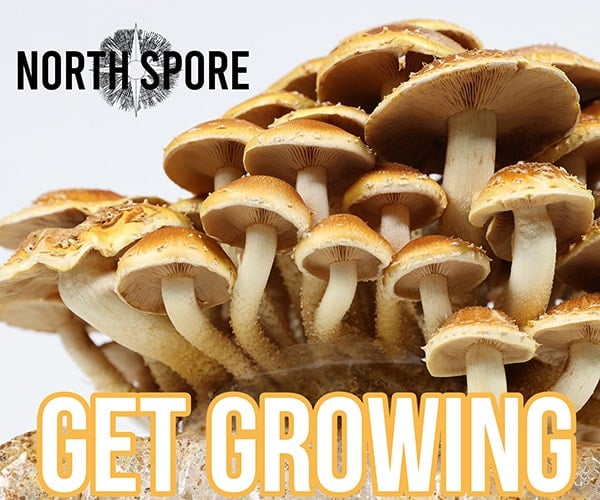
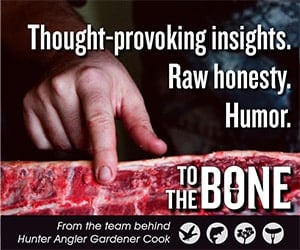
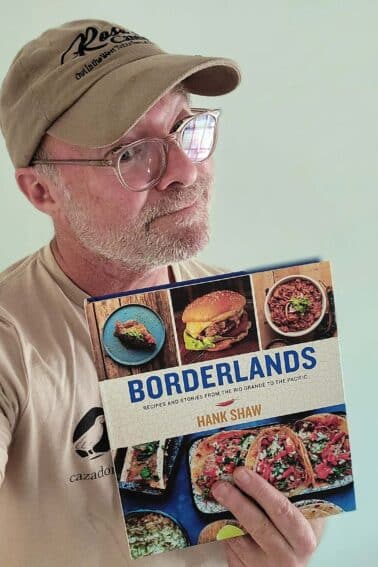
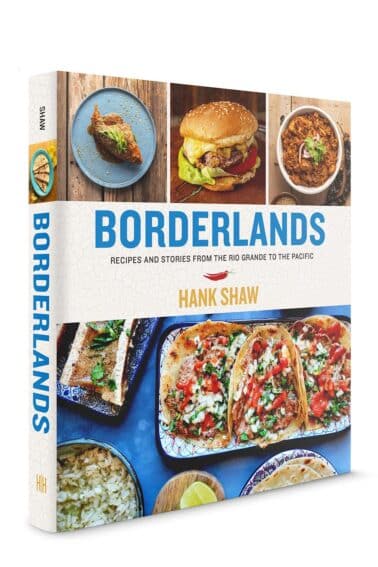
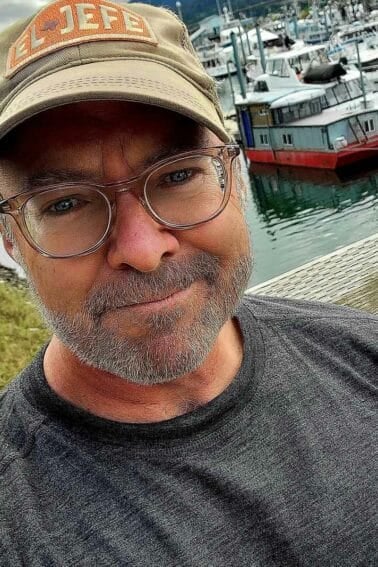
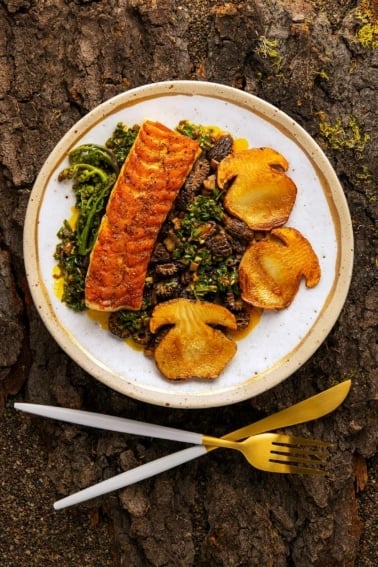
Beautiful essay, Hank. It should be considered for Best Food Writing 2011. Really, it’s that good. It speaks to the mind, heart and soul.
You explained it very well. The emotions felt while hunting are difficult for me to explain to non-hunters. I’m a hunter and I can still remember the first shot that I took years ago that made me one. I smiled and cried at the same time, and touched the pig, promising it that it was for a good cause and be treasured. For a family of 4, we spend about $20 a week at the grocery store. We grow or harvest almost everything we need, from potatoes and beans, to rabbits we raise and deer we hunt. It not out of need financially, it’s out of need spiritually. The sense of fulfillment is one that very few people I know have felt. Not only do know I will survive no matter what life gives me, I know that I am up to the challenge of being able to take care of myself and family. My children know that steaks don’t naturally come wrapped in plastic, leather doesn’t come from Macy’s, and that it is very easy to eat healthy, the way God wanted us to.
Hank, this is so fantastic. Thanks for sharing these thoughts, and your years of experience. Over at my newish blog, which a few other young homesteaders and hopeful homesteaders-to-be follow, we discussed something very much like this a while back. My post was similar in nature to yours, discussing the realities and complexities of killing your own food. The responses I got, and the ones you’ve gotten, just scream out loud and clear that the world needs to hear words like yours, about this kind of intimate experience with the land, with other earthlings. It’s so important. A thousand cheers! More more!
Hello,
Your deeply considered argument “On Killing” is a testament to your “moving” meditations when you are hunting and the inner stillness and contemplation that you surely experience. I’ve been reading your blog for weeks in silence, but I just had to speak out about this post. I am moved by your words and will never again engage in wholesale judgement of game hunters.
Alaiyo
Hank,
Thank you for writing this thought provoking post. It really made me think about my own morals when it comes to killing for food and what I believe is right and wrong. This post was very well written. Thanks again.
I was sent this story by a very good friend, Mark Cousins, he is the head of Hunter Education in Colorado. I believe that you have put into words the feelings that hunters like my self can really “sink our teeth into”. All I can say is thank you for saying it so well.
I’d love to get into hunting for the reasons you’ve so eloquently stated. I have a similar emotional response even for the fish that I dispatch. Thanks for writing this.
Hank –
Went hunting for the first time ever at the age of thirty. Hiked and hiked and hiked some more searching for elk. Almost got a shot, but after five freezing, exhausting days I came home with nothing. We all struck out. It was a soul-shattering, mind blowing, body hurting experience. The day after I returned from the woods I planted a winter garden in my little hoop houses. I think this is what it means to be a vegetarian. Thanks for your thoughts.
Hank, great job, and really well done. Here is a link to a magazine article on why I hunt that I wrote for a food magazine last winter.
I got your book yesterday, along with Al’s Gut It, Cut It Cook It. Great stuff.
I shot a deer over the weekend, processed it beginning to end Sunday, then went bird hunting with my 12 year old grandson. My girlfriend, who had been after me to shoot a deer at our house because of all the damage they’ve done to her landscaping, was at first elated. But when she saw all the work and the hands-on nitty gritty of processing a deer, it really set her back.
I told her that every person should have to kill, gut and process an animal early in life, because you will have such a different view of the meat you eat from that point on. I think that whole process takes you to a totally new and deeper level as a human in nature. You expressed those ideas wonderfully.
I read some sections of your book to my girlfriend last night, and we discussed a lot of the ideas you cover in this essay. I think she’s really coming to grips with the concept of killing your own food, and why I hunt. I also have to say that I feel an unusual pride in the skills necessary to butcher an animal.
This is an essay I’ll read again, probably many times. Thanks!
Robert Smith
Awesome post. The very thing I’ve been thinking so much about about recently. I raise beef and carry this crazy paradox with me all the time as I care for and love the cows I raise to slaughter.
Recently, I brought some of my steaks to cook dinner with a friend. She took my steaks, showed them no regard, ruined them and thought nothing of just grabbing some new ones from her freezer to try again.
I knew right then how drastically my world has changed by the acceptance of death in my life. The fact that my friend will never imagine just how crushed I was by the way she treated my treasured meat really illustrated what an outsider I have become in my old suburban plastic wrapped world.
It’s crossed my mind more than once that I’d much rather have the death my steers will have than a million different options that I could very well experience. I suppose that makes me not so fit for polite company : )
Elegant essay, Hank.
The number of people who must hunt to eat is rapidly approaching zero. Perhaps this is not a good thing, since the need to explain to those who do not hunt tells us a great deal about how the human relationship to the land has changed.
When the land becomes an abstraction, when much of our population lives in a cocoon, when ‘moralists’ attempt to create a fanciful new reality, hunting keeps us grounded and ultimately teaches us the value of all life.
Good read. Thanks.
Loved it and appreciated your being able to put into words what I’ve so often felt.
Well Done.
BTW, would love to see some more recipies for ground venison!
Beautifully written, Hank! As one of your vegetarian admirers, I’ve always respected the sustainable approach you take to your food. To know it, to grow it, to discover it in the wild: a way of life not many can aspire to! I’m not sure anyone is more “awake at the whisk” and conscious of where their food comes from than you. Brilliant piece of writing.
Thank you. One of my proudest moments as a father was hooking a rockfish for my then 5 year old daughter to reel in. On the way home we filled a small container of blackberries from the side of the road. I had her watch me clean the fish and help prepare a fruit salsa. We ate the fish for lunch less than an hour out of the water. Whether she ever raises a fishing rod again, she will retain a different relationship with nature and with food for as long as she retains the memory. My family has lived in the Pacific NW for well over a hundred years, my relations felled the trees and harvested the salmon that helped fuel our nation’s westward expansion–a source of pride for me and disgust for most of those who have arrived here in the last 20 years or so. We as a society have left the primal thrill of the hunt and the fruit of the endeavor for the chasing of information and the harvesting of money. The deeply considered and complex relationship that you maintain with nature is the thing that will preserve it…not the disdain and revulsion that you (or I, or my fellow commenters) might receive from those who believe the wild world is best foraged from a mountain bike and that food comes from their local PCC.
I started hunting as a teen in the midwest. The first, and last deer I shot has stuck with me for more than half my life. I gut shot a giant doe. It bled like crazy and ran. I assumed I’d find it 50 yds away. I tracked it for miles. I never did find it. I’m certain that it suffered for hours that night and it was my fault.
I still hunt and fish. I’d hunt deer again as well. Subconsciously I think I’ve sabotaged any opportunity I’ve had to use a deer tag. I don’t know if I agree with your opinion that we all have blood on our hands. But I do have blood on mine, and it’s not something I take lightly.
Those “hunters” who only celerbrate, and never reflect on what they do make me sick. Top of the list is that celebrity duck “hunter” with all of those sleazy behind the scene massacre scenes.
Really well done Hank. Every meal of duck, goose or pheasant reminds me of the hunt: the planning, travel, friendships and the shot that put the bird on the table. Your essay captures the wide range of emotions involved, and I hope will help non-hunters understand a little better why we hunt.
Hank,
Thank you, you’re words ring true of a contemplative hunter. These sorts of essays (in defense of hunting) always make me wonder about how indifferent we are to killing other organisms. Almost everything we eat (minus minerals and water) is/was living and yet we only reflect deeply when the evolutionary relationship is close. Has anyone read an essay from a miller describing the mixed feelings over grinding wheat embryos, a brewmeister regarding malting barley embryos, or a mushroom hunter when frying the spores? All humans are killers when it comes to food – some simply put limits on what is acceptable for them to kill.
Thanks, Marc
Your essay was truly a pleasure to read. Many years ago I sat in my car with the stereo turned up loud, so as not to hear the screams of a domestic rabbit my husband was feeding to our large python. How things change. Now as a falconer I thrill to hear those same screams from the jackrabbits my hawk catches, as they mean success. She clamps her talons over the mouth and nose of the hare to stop the screaming. It is a life and death struggle, as her life cannot continue without the jack’s death. I make in with all due haste to dispatch the rabbit as quickly as possible, both for the safety of my hawk and to minimize the suffering of the prey. It is during these moments, when I literally hold the lives of two magnificent animals in my hands, that the inner conflict rears its head. The choice to kill is what gives me the intimacy you mentioned, not only with the hare, and of course with my hawk, but also with the desert which all three of us call home. It gives me ownership of wild lands, and with ownership comes stewardship, a deep desire to see these deserts remain untouched and beautiful.
Thank you for a great read.
A beautifully wrought piece Hank. A few weeks ago, reflecting on two pheasants I’d killed but never did find, I realized quite clearly that the relationship between hunter and prey is founded on uncertainty but that once an animal comes to hand that relationship is transformed into one of almost unbearable intimacy. A lost animal is an abrupt interruption of the unfolding of that intimate relationship. Your piece makes that relationship, or at least an understanding of it, accessible to those who have not experienced it for themselves. Great writing.
Hank,
I’ve hunted with you, and whooped with you, and it’s great to see your writings concerning this subject. Thanks to you, Charlie, and Holly, I enjoyed a return to duck hunting after many years of absence from the field. I took the studious way of returning to hunting, by examining some of the books that you and Holly recommended, and it has been my experience that I go through the same emotional connections as most hunters you’ve described.
I’ll be coming up North on my way to Seattle, and hope to see you, get a signed copy of your book, and hunt with you and Charlie…heck, even Holly can come and do her duck dance. I also want to see if you can recommend someone to take cooking classes with in the Los Angeles area. That might also be one of the ways to pass on your heritage. It will be the way I am remembered by many who have been to my table, and eaten wild meat for the first time.
Best, R